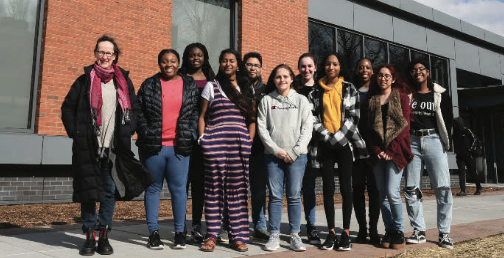
Rider receives grant to improve experience for underrepresented students
By Tori Pender
Rider’s new program, the Bronc STEM Teaching Partner (BSTP) program, works with chemistry, biology, psychology, physics, math and computer science courses to improve the classroom experience of underrepresented students.
The BSTP program was spearheaded by Julie Drawbridge, a professor in the department of biology, behavioral neurosciences and health sciences.
According to Drawbridge, the program is modeled after a similar program at Bryn Mawr College in Pennsylvania that focuses on historically marginalized groups in the STEM field.
The BSTP program pairs volunteered faculty members with student partners to create an inclusive classroom environment. The fall 2021 semester and spring 2022 semester both had eight faculty-student pairings.
The program was a recipient of a $19,976 grant from Bristol Myers Squibb. Drawbridge explained that the grant money is used to pay the student mentors. Drawbridge said that the program is actively recruiting students, and they do not have to be science majors since they will not be enrolled in the courses they monitor.
Drawbridge currently has a student partner in her BIO 116 course. “A lot of life science majors have to take this course, so it’s a pretty big course, and it’s the sort of course I want to target for this particular program,” said Drawbridge.
The ultimate goal of this program, according to Drawbridge, is to make it available to every section, every major and for all faculty members.
Ashley Perez, a sophomore chemistry major, has been a part of BSTP since the 2021 fall semester.
Perez explained, “It was something new for me to have, a psychology class, because I’m a chem major. But it was also exciting to be able to learn and help students feel more welcomed. I had a great teacher/partner and getting to know them was a great opportunity in building relationships with faculty.”
Perez covered PSY 338 Learning and the Experimental Analysis of Behavior with professor Robert Isenhower, an experience she found very intriguing.
“I know it might be scary to give feedback to a teacher, but if you have ever felt uncomfortable, unheard [or] underrepresented in a class, something you can do is participate in this program so that someone else doesn’t go through the same experience. It’s a great way to help future generations,” said Perez.


